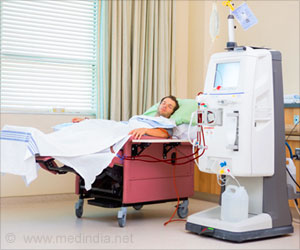New approach to nurses′ solution‐focused communication with patients may improve the control of fluid intake during hemodialysis.

‘New approach to nurses′ solution‐focused communication with patients may improve the control of fluid intake during hemodialysis.’





The study, conducted in collaboration with María del Carmen Neipp (Miguel Hernández University of Elche), Maite García-Moreno (Hospital Complex of Navarre, CHN) and Inés González-Sánchez (General University Hospital of Alicante and the Cardenal Herrera University of Elche), has been published recently. It will shortly be replicated at two hospitals in La Rioja, so both nurses and kidney specialists will undergo training.The question that the research aims to address is how to facilitate the reduction in the intake of liquid (and food) of certain patients on hemodialysis who have problems in achieving this, "something that the majority find tremendously difficult and uncomfortable, in particular during these hot months," said Beyebach.
The aim is to ensure that the weight gain between one session and the next should be the indispensable minimum and that, therefore, the work of the machine that is purifying the blood should take the shortest possible time. Various pieces of research have shown that in that way not only is the comfort of the hemodialysis sessions increased, the life quality of the patients is improved, and their survival extended.
Changing the communicative style in order to achieve results
"It is a pilot study, not controlled and carried out on a small sample, but which explores an innovative alternative that no one has studied until now and which is pointing to some promising results," stressed the researcher.
Advertisement
"It is necessary to empathize with the difficulties facing the patients and to reinforce positive behavior, each patient's own resources," he said. "You also have to bear in mind that many of these patients have been waiting for a transplant for years and their moods are close to depression, so merely instructive communication is of no use whatsoever," he said.
Advertisement
"The study published now suggests that by improving the style of communication with the patients, significant results can be achieved and that is what we want to demonstrate ultimately with the next study that we will be conducting in La Rioja," said Beyebach.
Source-Eurekalert












